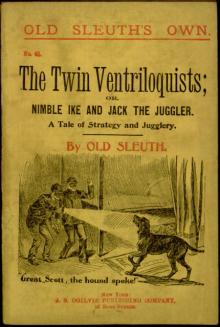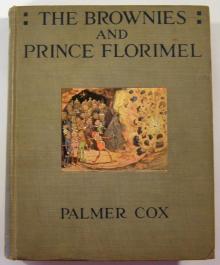- Home
- Amanda M. Douglas
A Little Girl in Old Quebec
A Little Girl in Old Quebec Read online
Produced by Marilynda Fraser-Cunliffe, J.P.W. Fraser, MaryMeehan and the Online Distributed Proofreading Team athttps://www.pgdp.net
A LITTLE GIRL IN OLD QUEBEC
By AMANDA M. DOUGLAS
A. L. BURT COMPANYPUBLISHERS NEW YORK
Copyright, 1906BY DODD, MEAD & COMPANY
CONTENTS
I. A WILD ROSE
II. THE JOY OF FRIENDSHIP
III. SUMMER TIME
IV. A HUSBAND
V. CHANGING ABOUT
VI. FINDING AMUSEMENTS
VII. JOURNEYING TO A FAR COUNTRY
VIII. WHAT ROSE DID NOT LIKE
IX. ABOUT MARRIAGES
X. MILADI AND M. DESTOURNIER
XI. A FEAST OF SUMMER
XII. A LOVER IN EARNEST
XIII. FROM A GIRL'S HEART
XIV. A WAY OVER THORNS
XV. HELD IN AN ENEMY'S GRASP
XVI. A LOVER OF THE WILDERNESS
XVII. THE PASSING OF OLD QUEBEC
A LITTLE GIRL IN OLD QUEBEC
CHAPTER I
A WILD ROSE
Ralph Destournier went gayly along, whistling a merry French song thatwas nearly all chorus, climbing, slipping, springing, wondering in hisheart as many a man did then what had induced Samuel de Champlain todream out a city on this craggy, rocky spot. Yet its wildness had animpressive grandeur. Above the island of Orleans the channel narrowed,and there were the lovely green heights of what was to be Point Levis,more attractive, he thought, than these frowning cliffs. The anglebetween the St. Charles and St. Lawrence gave an impregnable site for afortress, and Champlain was a born soldier with a quick eye to seize onthe possibility of defence.
On the space between the cliffs and the water a few wooden buildings,rough hewn, marked the site of the lower town. A wall had been erected,finished with a gallery, loopholed for musketry, and within this werethe beginnings of a town that was to be famous for heroic deeds, for menof high courage, for quaintness that perpetuates old stories which areperfect romances yet to-day after the lapse of three centuries.
There was a storehouse quite well fortified, there was a courtyard withsome fine walnut trees, and a few gardens stretching out with pleasantgreenery, while doves were flying about in wide circles, a reminder ofhome. Ralph Destournier had a spirit of adventure and Champlain was agreat hero to him. Coming partly of Huguenot stock he had fewer chancesat home, and he believed there was more liberty in the new world, abetter outlook for a restless, eager mind.
He went on climbing over the sun-baked cliffs, while here and there in adepression where rain could linger there were patches of verdure, treesthat somehow maintained a footing. How unlike the level old seaport townwhere he had passed a good part of his youth, considered hisgrandfather's heir, when in the turn of fortune's wheel the sturdy oldHuguenot had been killed in battle and his estates confiscated.
Something stirred up above him, not any small animal either. It crackledthe bushes and moved about with a certain agility. Could it be a deer?He raised his gun.
Then a burst of song held him in amaze. It was not a bird, though itseemed to mock several of them. There were no especial words or rhymes,but the music thrilled him. He strode upward. Out of a leafy bowerpeered a face, child or woman, he could not tell at first, a crown oflight, loose curling hair and two dark, soft merry eyes, a cherry-redmouth and dimpled chin.
"Hello! How did you get up there?" he asked in his astonishment. Indianssometimes lurked about.
"I climbed. You did not suppose I flew?"
The tone was merry rather than saucy, and taking a few steps nearer, hesaw she was quite a child. But she wore no cap and she shook thewind-blown hair aside with a dainty gesture. There was a fearlessnessabout her that charmed him.
"And you live--here?"
"Not here in the woods--no. But down in the town. Down there by thegarden, M'sieu Hebert and the General. And Maman has one. But I hateworking in it. So I ran away. Do you know what will happen to me when Igo back?"
"No, what?" with a sense of amusement. "Perhaps you will get no supper!"
"I shall be whipped. And to-morrow I shall not be let out of the garden.When I get to be a woman I won't work in the garden. I won't even have ahusband. They make you do just as they like. Why isn't one's way as goodas another's?"
A line of perplexity settled between her eyes that were soft enough tomelt the heart of a stone, he thought, if stones really had hearts.
"Older people are generally wiser. And mothers----"
"Oh, she isn't my mother," interrupted the child. "Even Catherine wasnot my mother. I was very sorry for that. She was good and tender, butshe died. And Jean was very angry because she was not my real mother,and he would have nothing to do with me. So he brought me to Maman. Oh,it was a long while ago. Maman is good in some ways. She gives me plentyto eat when we have it and she does not beat me often, as she doesPani."
"And who is Pani?"
"Oh, the little slave. His tribe was driven away after they had losttheir battle, but some of the children were left behind and they areslaves. Do you suppose the Indians will ever conquer M. de Champlain?Then we should be slaves--or killed."
He shuddered. Already he had heard tales of awful cruelty in thetreatment of prisoners.
"Are you not afraid some Indians may be prowling about?" and he glancedfurtively around.
"Oh, they do not come here. They are good friends with M. de Champlain.And the fort is guarded. I should hide if one came."
She began to descend and presently reached his level.
"There are long shadows. It gets to be supper time."
He smiled. "Are the shadows your clock hands?"
"We have no clock. M. de Champlain carries his in his pocket. But yousee the sun sends long shadows over to the east. It is queer. The sunkeeps going round. What is on the other side?"
"It would take a good deal of study to understand it all," he returnedgravely.
"I like to hear them talk. There are wonderful places. And where isIndia? Can any one find the passage they are looking for and sail roundthe world?"
"They have sailed round it."
"And have you seen Paris and the King?"
"I fought for the dead King. And Paris--why, you cannot imagine anythinglike it."
"Ah, but we are going to have new France here. And perhaps Paris."
There were pride and gladness in her voice. He smiled inwardly, he wouldnot disturb her childish dream. Would she ever see the beautiful cityand the pageants that were almost daily occurrences?
"When did you come here?" she asked presently.
"A fortnight ago, when the storeship arrived."
"Ah, yes. Maman and I went to see it and M. Hebert sent us some curious,delicious dried fruits. M. de Champlain is quite sure we shall grow themin time and have beautiful gardens, and fine people who know manythings. Can you read?"
"Why, yes"--laughing.
"I wish I could. But we have no books. Maman thinks it a waste of time,except for the men who must do business and write letters. Can you writeletters?"
"Yes"--studying her with amusement.
"Catherine could read. But she had no books. I once learned some of theletters. Jean could make figures."
"Where is he?"
"Oh, off with the fur-hunters. And Antoine makes ever so much money. Andhe says he and Maman will go back to France. And I suppose they willleave me here. Antoine has two brothers and one is at Brouage, where M.de Champlain was born."
She leaped from point to point in a graceful, agile manner, ran swiftlydown some declivi
ty, while he held his breath, it seemed so fraught withdanger, but she only looked back laughingly. What a daring midget shewas!
And when they were in sight of the palisades they saw a group of men,Pontgrave and Champlain among them. Destournier quickened his pace andtouched his hat to them with a reverent grace.
"Have you had a guide?" and Champlain held out his hand to the littlegirl while he asked the question of Destournier. She took Champlain'shand in both of hers and pressed it against her cheek. Pontgrave smiledat her as well.
Destournier glanced up at the eminence where he had first seen themoving figure. How steep and unapproachable!
"Could you find no fairer site for a new Paris?" he inquired smilingly."How will you get up and down the streets when you come to that?"
"Is it not the key to the north and a natural fortress? Look you, with acannon at its base and over opposite, no trading vessel could steal up,no hostile man-of-war invade us. There will come a time when the oldworld will divide this mighty continent between them and the strugglewill be tremendous. It will behoove France to see that her entrances arewell guarded. And from this point we must build. What could be afairer, prouder, more invincible heritage for France? For we shall sweepacross the continent, we shall have the whole of the fur trade in time.We shall build great cities," and Champlain's face glowed with the pridehe took in the new world.
Yet it was a small beginning, and a less intrepid soul would have beendaunted by the many discouragements. A few dwelling houses, a moat witha drawbridge, and the space of land running down to the river dividedinto gardens. The Sieur de Champlain found time to sow various seeds,wheat and rye as well, to set out berries brought from the woods andnative grape vines that were better fitted to withstand the rigorousclimate. But now it was simply magnificent, glowing with the earlyautumn suns.
"I have a good neighbor who takes a great interest in these things. Youmust inspect Mere Dubray's garden. With a dozen emigrants like her weshould have the wilderness abloom. She rivals Hebert. We must have someagriculture. We cannot depend on the mother country for all our food.And if the Indians can raise corn and other needful supplies, why notwe?"
"Ah, ha! little truant!" cried Mere Dubray, with a sharp glance at thechild, "where hast thou been all the afternoon, while weeds have beengrowing apace?"
"She has been playing guide to a stranger," explained Destournier, "andI have found her most interesting. It has been time well spent."
Mere Dubray smiled. She always felt honored by the encomiums of M. deChamplain. She was proud of her garden, as well, and pleased to havevisitors inspect it. Indeed the young man thought he had seen no neatergardens in sunny France.
"Mere Dubray," he said, "convert this young man into an emigrant. I am alittle sorry to have him begin in the autumn when the summer is so muchmore enticing. But if the worst is taken first there is hope for betterto cheer the heart."
Something about her brought to mind the women of old France who sturdilyfought their way to a certain prosperity. She was rather short andstout, but with no loosely-hanging flesh, her hair was still coal-black,with a sharp sort of waviness, and her eyes had the sparkle of beads.Her brown skin was relieved by a warm color in the cheeks and the red,rather smiling lips. No one could imagine the child hers. It was nothingto him, yet he felt rather glad.
Destournier was very friendly, however, and found her reallyintelligent. The little girl ran hither and thither, quite a privilegedcharacter. There were very few children beyond the Indians andhalf-breeds. The fur-hunters often went through a sort of ceremony withthe Indian girls during their weeks of dickering with the traders. Somereturned another season to renew their vows, others sought new loves.
"I suppose the child has some sort of story?" he said to Champlain asthey sat in the evening smoking their pipes.
"The child? The reputed mother came over with some emigrants sent by theKing, and as a widow she married Jean Arlac. He, it seems, was muchdisappointed at not having children of his own and was not over-cordialto the little girl. Rather more than a year ago his wife was taken ill,she had never been robust. And in her last moments she confessed thechild was not her own, but that of a friend, and before she told thewhole story a convulsion seized her. Jean was very angry and declaredthe child was nothing to him. He brought it to Mere Dubray and then wentoff to the fur regions, from whence the tidings came that he had marriedan Indian woman and taken a post station. She is a bright little thing,and I think must have come of gentle people. Her only trinket is a chainand locket, with a sweet young face in it."
"But there is no chance here for any sort of education. She seemsnaturally intelligent."
"There will be soon. There is a plan to bring out some nuns, and weshall build a chapel. We cannot do everything at once. The mothercountry cannot be roused to the importance of this step. It is notsimply to discover, one must hold with a secure hand. And we must makehomes, we must people them."
Pontgrave was to return to France. Ralph Destournier had half a mind toaccompany him, but he was young and adventurous and desirous of seeingmore of this strange country. At last he cast in his lot with them forthe year at least.
October was a gorgeous month with its changing colors, its rather sharpnights when the log fires were a delight, and its days of sunshine thatbrought a summer warmth at noon. At night the sky sparkled with stars.
The buildings were calked on the outside and hung with furs within.Harsh winds swept down from the northwest, everything was hooded withsnow. Now one counted stores carefully and wasted nothing, thoughChamplain's ever sympathetic heart dealt out a little from his not tooabundant supplies to the wandering Montagnais and gave their women andchildren food and shelter. There was a continual fight to keep eventolerably well. Scurvy was one enemy, a low sort of fever another.
There were many plans to make for the opening of spring. Yet RalphDestournier would have found it intolerably dull but for the little girlwhose name was Rose. He taught her to read--Champlain fortunately hadsome books in French and Latin. There were bits of old history, a volumeof Terence, another of Virgil, and out of what he knew and read hereconstructed stories that charmed her. Most of all she liked to hearabout the King. The romances of Henry of Navarre fired herrapidly-awakening imagination.
Destournier took several little excursions with the intrepid explorerbefore the severest of the winter set in. What faith he had in thiswonderful new France that was to add so much glory and prosperity to theold world! If its rulers could have but looked through his eyes and hadhis aims. There was Tadoussac, there was the upper St. Charles, whereJacques Cartier and his men had passed a winter that in spite of theutmost heroism had ended in the tragedy of death. To the south there wasa sturdy band of Englishmen trying the same experiment, not merely fortheir King and country, but also some reward for themselves. Neitherwere they eager to plant the standard of religion; that was left forPuritans and French missionaries.
It seemed to Destournier that the scheme of colonization was hardlyworth while. He had not Champlain's enthusiasm--there was much to do forFrance, and that land had always to be on the defensive with England.Would it not be so here in the years to come? And the Indians would be acontinual menace.
But there was a whole continent to convert, to civilize. He went back tothe times of Charlemagne and the struggles that had brought out aglorious France. And no one had given up the passage to India. Lyingwestward was a great river, and what was beyond that no one knew. It wasthe province of man to find out.
It was a dull life for a little girl in the winter. Rose almost longedfor the garden, even if weeds did grow apace. In the old country MereDubray had spun flax and wool, here there was none to spin. She hadlearned a little work from the Indian women, but she was severelyplain. What need of fringes and bead work and laying feathers in rows tobe stitched on with a sort of thread made of fine, tough grass? And asfor cooking, one had to be economical and make everything with a view toreal sustenance, not the high art of cooking, though he
r peasant lifehad inducted her into this.
The little girl made a playhouse in one corner of the cabin and stood upsticks for Indian children to whom she told over what had been taughther. They blundered just as she had done, but she had a curious patiencewith them that would have touched one's heart.
"What nonsense!" Mere Dubray would exclaim. "It is well enough for men,and priests must know Latin prayers, but this is beyond anything a womanneeds. And to be repeating it to sticks----"
"But I get so lonely when they are all away," and the child sighed. "Thereal Indian girls were a pleasure, but I'm afraid you could not teachthem to read any more than these make-believes."
"Yes, winter is a dreary time. I'm not sure but I would rather be up inthe fur country with my man. It seems they find plenty of game."
There was not so much game here, for the Indians were ever on the alertand the roving bands always on the verge of starvation. But once in awhile there was a feast of fresh meat and Mere Dubray made tasty messesfor the hungry men.
Rose, bundled up in furs sometimes, ran around the gallery where theyhad cleared the snow. Then there were the forge and the workshop, wherethe men were hewing immense walnut trees into slabs and posts for springbuilding. Some days the doves were let out of the cote in the sunshineand it was fascinating to see them circle around. They knew the littlegirl and would alight on her shoulder and eat grains out of her hand,coo to her and kiss her. Destournier loved to watch her, a real child ofnature, innocent as the doves themselves. Mere Dubray had scarcely moreidea of the seriousness of life or the demands of another existencebeyond. She told her beads, prayed to her patron saint with small ideaof what heaven might be like, unless it was the beautiful little hamletwhere she was born. And as she was not sure the child had beenchristened, she thought it best to wait for the advent of a priest todirect her in the right way.
She was not a little horrified by Destournier's curious familiarity withGod and heaven, as it seemed to her. Rose understood almost intuitivelythat it terrified her, that it seemed a sacrilege, though she would nothave known what the word meant. So she said very little about it--it wasa beautiful land beyond the sky where people went when they died.Sometimes, when the wonderful beauty of sunset moved her to a strangeecstasy, she longed to be transported thither. And in the moving whitedrifts she saw angel forms with out-stretched arms and called to them.
The beginning of the new year was bitter indeed. Snow piled mountainhigh, it seemed a whole world of snow. For windows they had clothsoaked in oil, but now the curtains of fur were dropped within and abarricade raised without. There were only the blazing logs to give lightand make shadows about. They hovered around it, ate nuts, parched corn,and heated their smoked eels. They slept late in the morning and went tobed early. The lack of exercise and vegetables told on health, andtowards spring more than one of the little band went their way to theland beyond and left a painful vacancy. But one week there came amarvellous change. The mountains of snow sank down into hills, there wasa rush in the river, the barricades were removed from the windows andthe fur hangings pushed aside to let in some welcome light.
Rose ran around wild. "I can recall last spring," she said, with a burstof gayety. "The trees coming out in leaf, the birds singing, theblossoms----"
"And the garden," interposed Destournier.
Rose made a wry face.
"It will be an excellent thing for you to run about out of doors. Youhave lost your rosy cheeks."
"But I am Rose still," she said archly.
She ran gayly one day, she went up the stream in the canoe withDestournier and was full of merriment. But the next day she feltstrangely languid. Most of the men had gone hunting. Mere Dubray waspiling away some of the heaviest furs.
"Thou wilt roast there in the chimney corner," she said rather sharply."Get thee out of doors in the fresh air again. It is silly to think onecannot stir without a troop of men tagging to one. Thou art too youngfor such folly."
"My legs ache," returned the child, "and my head feels queer and goesround when I stir. And I am sleepy, as if there had not been any night."
Mere Dubray glanced at her sharply.
"Why, thy cheeks are red and thy eyes bright. Come, stir about or Ishall take a stick to thee. That will liven thee up."
The child rose and made a few uncertain steps. Then she flung out herhands wildly, and the next instant fell in a little heap on the floor.
The elder looked at her in amaze and shook her rather roughly by thearm. And now the redness was gone and the child had a strange gray look,with her eyes rolled up so that only a little of the pupil showed.
"Saint Elizabeth have mercy!" she cried. "The child is truly ill. Andshe has been so well and strong. And the doctor gone up to Tadoussac!"
She laid her on the rude couch. Rose began to mutter and then broke intoa pitiful whine. There were some herbs that every householder gathered,there were secrets extorted from the squaws much more efficacious thanthose of their medicine men. The little hand was burning hot; yes, itwas fever. There had been scurvy and dysentery, but she was a littlenon-plussed by the fever. And the Sieur would not be here untilto-morrow; the doctor, no one knew when.
She took out her chest of simples, a quaintly-made birchen-barkreceptacle. They had been carefully labelled by the doctor. Yes, herewas "fever"--here another. Which to take puzzled her.
"I might try first one and then the other," she ruminated. "I would getthe good of both. And they might not mix well."
She boiled some water and poured it over the herbs. It diffused abitter, but not unpleasant flavor. Then she put it out of doors to cool.
Rose was sleeping heavily, but her eyes were half open and it startledMere Dubray.
"A child is a great responsibility," she moaned to herself. "If theSieur were only here, or the doctor!" She woke her presently andadministered the potion. But it brought on a desperate sickness.
"Perhaps I had better try the other." She took the hot, limp hand, thecheeks were burning, but great drops of perspiration stood out on theforehead. She twisted the soft hair in a knot and struck one of herhighly-prized pins through it, then she thought a night-cap would bebetter. Only they would be a world too large for the child. But shesucceeded in pinning it to the right shape, though she grudged the twopins. They were a great rarity in those days, and if one was lost hourswere spent hunting it up.
The second dose fared better. There was nothing to do but let the childsleep. She busied herself about the few household cares, studied theweather and the signs of spring. Oh, was that a bird! Surely he wasearly with his song. The river went rushing on joyously, leaping,foaming as if glad to be unchained. The air had softened marvellously.Ah, why should one be ill when spring had come!
The kindly Mere repeated her dose. Towards night the fever seemed toabate, but the child was desperately restless and the worthy woman muchtroubled. Yet what was the child to her? to any one? And death was sureto come sometime. She would be spared much trouble. She would also losemuch happiness. But was there any great share of it in this new world?
Rose was no better the next day. The nausea returned and clearly she wasout of her head. But late this afternoon the Sieur and the young guestreturned and were so much alarmed they dispatched an Indian servitorwith instructions to bring the doctor at once.
"A pretty severe case," he said, with a grave shake of the head. "Youhave done the best you could, Mere Dubray, and children have wonderfulrecuperative powers. So we will try."
"Poor, pretty little thing," thought Destournier. "Will she findanything worth living for?" Women had so few opportunities in thosetimes. And when one was poor and unknown, and in a strange country. Yethe could not bear to think of her dying. There was always a hopefulfuture to living.

 A Little Girl in Old Washington
A Little Girl in Old Washington Kathie's Soldiers
Kathie's Soldiers The Radio Detectives Under the Sea
The Radio Detectives Under the Sea A Little Girl in Old Pittsburg
A Little Girl in Old Pittsburg A Little Girl in Old New York
A Little Girl in Old New York Washer the Raccoon
Washer the Raccoon A Little Girl of Long Ago; Or, Hannah Ann
A Little Girl of Long Ago; Or, Hannah Ann Wheat and Huckleberries; Or, Dr. Northmore's Daughters
Wheat and Huckleberries; Or, Dr. Northmore's Daughters With Porter in the Essex
With Porter in the Essex The Twin Ventriloquists; or, Nimble Ike and Jack the Juggler
The Twin Ventriloquists; or, Nimble Ike and Jack the Juggler The Brownies and Prince Florimel; Or, Brownieland, Fairyland, and Demonland
The Brownies and Prince Florimel; Or, Brownieland, Fairyland, and Demonland A Little Girl in Old Quebec
A Little Girl in Old Quebec Helen Grant's Schooldays
Helen Grant's Schooldays The Old Woman Who Lived in a Shoe; Or, There's No Place Like Home
The Old Woman Who Lived in a Shoe; Or, There's No Place Like Home A Little Girl in Old St. Louis
A Little Girl in Old St. Louis Marion Berkley: A Story for Girls
Marion Berkley: A Story for Girls